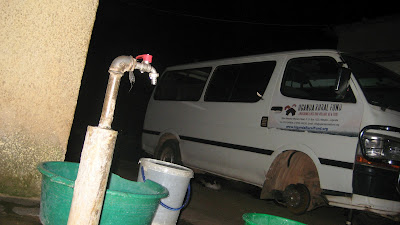Before leaving Canada I had a healing session with
a T’Souke Elder. She told me, among other things, that during my trip to
Uganda, I would meet a traditional male spiritual leader, dressed in brown
robes and he would be my spiritual guide and mentor. Not one to disagree with
an elder I thanked her and waited to meet him. The opportunity came in April at
a surprise mini summit on the topic of First Peoples.
“As oppressed people, the first thing colonizers get out of you is your
commonsense, so what are you left with? Common nonsense. Any country that
cannot stand on the shoulders of its history is a slave. What you must anchor
your education with is your own history and culture. Other languages should
just be forms of communication. Our ancestors built a knowledge and developed a
language and now it is time to “stand on their shoulders” and incorporate new
knowledge into the ancestors knowledge. When the first peoples of every country
do this to their culture, it improves the world. Work hard to recover what you
have lost. Form a bridge from each of us to broaden and deepen our respective
places (He speaks of all the first peoples of the world forming connections). A
new age is upon us is moving towards indigenous knowledge. Together we can
build a new world.”
–
A compilation of Quotes from The Afrikan Black Nation and The First
Nations People of Canada Mulembe Mutinzi Mini Summit at the Source of the Nile
Saturday 7 April, 2012.
As a proud Saulteaux First Nations woman I believe
that there is a mutual experience of oppression among many First Peoples. (I
say “Peoples” because we are not one homogenous group of people, the Canadian aboriginal
population compromises the Inuit, Metis and First Nations and even among those
groups there is great difference in cultures and traditions.) Much of our known
history is based not in our culture, but what was done to us by colonizers. It
was a tragedy that cannot be undone and there is healing that must happen for
our people. But survivors are still here because we are a tough and articulate
people.
After sharing my families experience of oppression
with the others the spiritual leader remarked upon what I had shared and said “You
are so proficient in what you said, your people are so articulate in English,
imagine if you spoke in your own language.” This made me think that although
our languages are dying, less than 2,000 people may speak a traditional First
Peoples language but that if other youth become interested, we can revive these
languages.
Why would I take French in school or do a French language
exchange if I could go to my own people, to stay in the communities of my
aunties and uncles in Saskatchewan and do a “cultural exchange?” Where I could
learn my own language, my own traditional crafts, hear my own history in
University? Why not take shawl dancing instead of ballet class? Learn to make bannock
instead of cupcakes? Learn to drum, and
beat out the creator’s heartbeat instead of the saxophone? Learn traditional spirituality
instead of going to a Catholic Church that shares ideas from another people and
another country? Those religions are worthy and I respect them, religion is a
wonderful gift, but it is not my gift, it is theirs. That religion comes from a
history and culture of another people that are not my people. While religion is
good to embrace I believe it is important to have a firm understanding of your
own spirituality and culture, otherwise what will anchor you to your own
culture?
In Uganda there are two types of weddings, they are
called a ‘Traditional Wedding,’ and a ‘White Wedding.’ A traditional wedding is
the same as it has been since pre-colonization by the British. A white wedding consists of a white dress and
marriage ceremony in a church. We, as First Peoples of Canada can also do this,
we can celebrate marriages and love in traditional ceremonies; it is our right.
Let us think differently about our culture, let it not be a way to separate
ourselves from others, but let us use it to gain equity so that we do not think
of ourselves as ‘oppressed peoples,’ but as peoples of a strong culture and
education that can extend love and understanding as equals to any other person.




